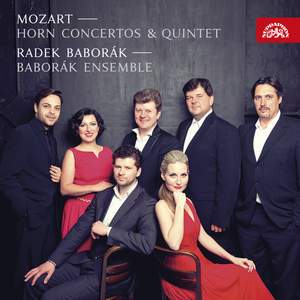Precious few have as much to say about Mozart’s horn concertos as does the superlative, internationally renowned Czech horn player Radek Baborák, who for a number of years was a soloist of the Berliner Philharmoniker.
An artist with a penchant for seeking out the new, he has joined forces with other outstanding musicians (including Štěpán Kratochvíl, from the Münchner Philharmoniker and the Lucerne Festival Orchestra, and Vilém Kionka, from the Royal Concertgebouw Orchestra) so as to interpret the pieces as arranged for horn and string quartet: “I liked the idea of presenting the concertos in the form they may have been heard when Mr. Leutgeb would visit the Mozarts’ home, get together with Mr. Michael Haydn and Mr. Süssmayr, and make music.”
In Mozart’s time, such treatments were quite common (Michael Haydn, for instance, transcribed the Rondo from Concerto No. 3), with their serving to pinpoint the dialogue between the virtuoso parts of the first violin and the horn. According to the preserved correspondence, Mozart tried his hand at the horn, which he found highly amusing. The composer wrote most of his horn works for his older friend, the far-famed virtuoso Joseph Leutgeb. His mocking comments in the score (“Wolfgang Amadé Mozart takes pity on Leutgeb, ass, ox, and simpleton.”), as well as writing Concerto No. 4 in inks of four colours, bear witness to the close relationship between the two artists. This playfulness and the sheer joy of making music together are duly reflected in this inspiring album, recorded by Radek Baborák and friends.
Following the album’s release, the Baborák Ensemble will be setting out on an extensive autumn tour of Japan. Radek Baborák says: “We’re really looking forward to visiting Japan, it will be our second trip to this musicians’ paradise. The local audiences are very attentive, there will certainly be in attendance a number of my fans, who will be listening carefully to every single note I will play. Yet that which I am looking forward to the most is the complete naturalness with which the Japanese music promoters, be they directors of concert halls, producers or managers, accept the fact that we have come to perform something unique, and how they are able to appreciate it by affording us the necessary scope and respect for our artistry and personalities. Besides playing with the Baborák Ensemble, this year I will also conduct the Tokyo Philharmonic, the New Japan Philharmonic and the Yamagata Chamber Orchestra. Moreover, I will be giving a few solo recitals and appearing at the special concert marking the 100th performance of the Mito Chamber Orchestra, along with Seiji Ozawa. Then, in January, the Kyushu Symphony Orchestra and I will celebrate W. A. Mozart’s birthday. Performing in Japan is a sheer joy!”






